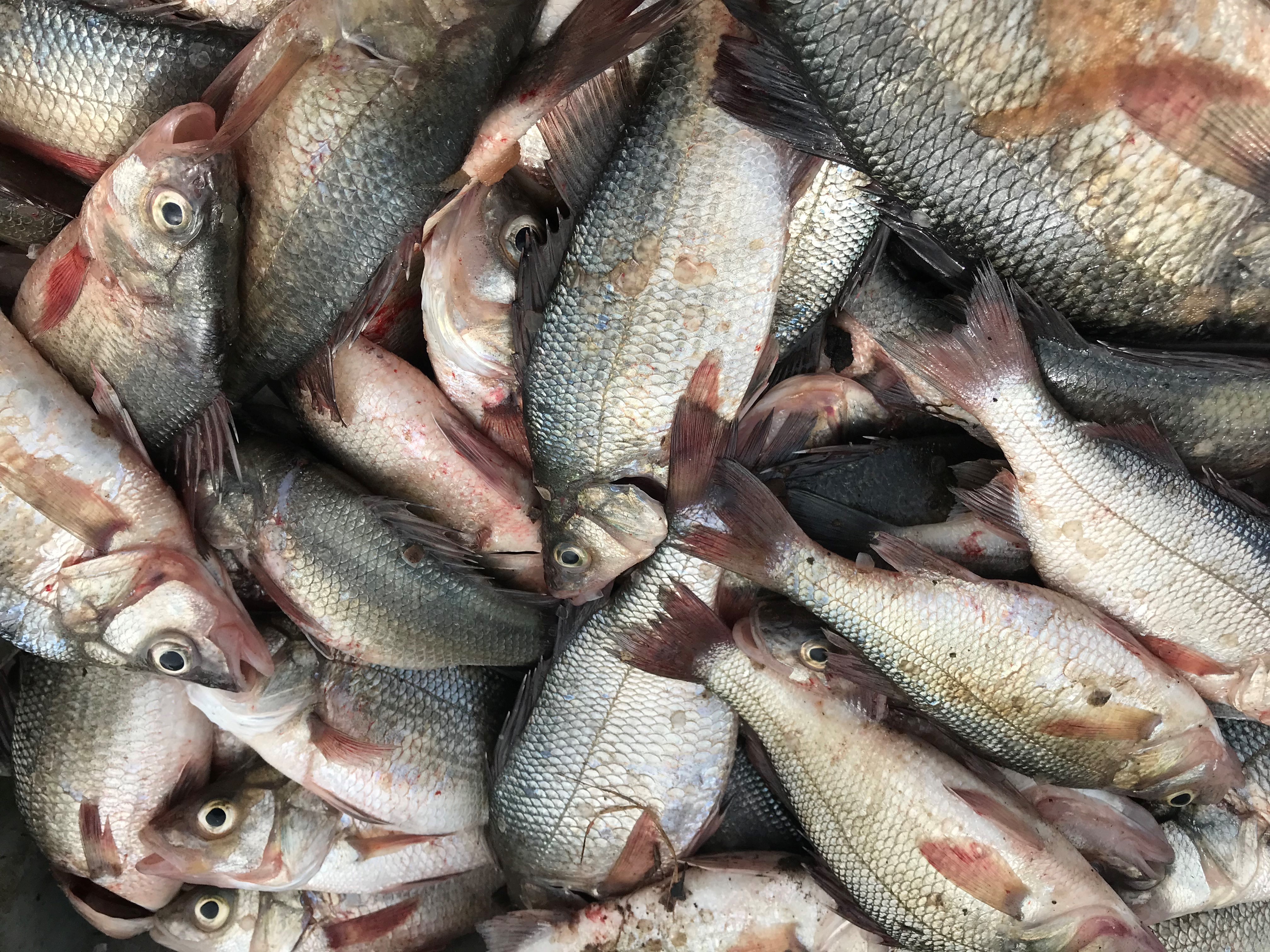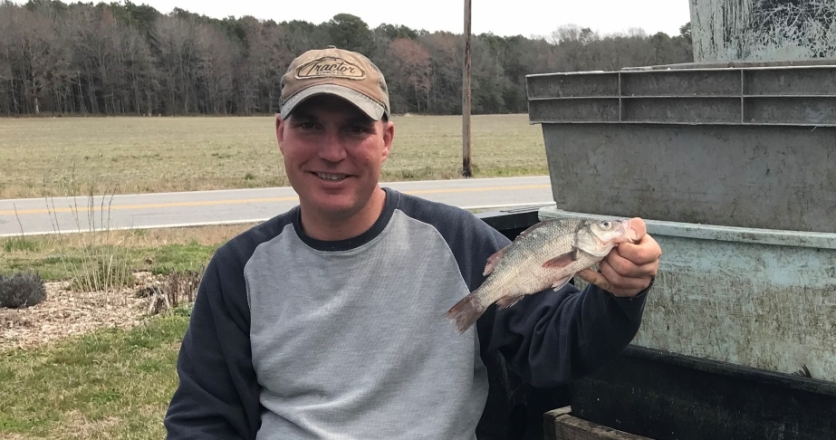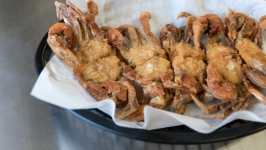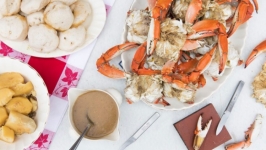Perfect Perch
Starting at the age of ten and the two summers that followed, my Cousin John who was more like an uncle, took me perch fishing many times on Island Creek. He and his wife lived a quiet life by the water’s edge, and I was very fond of them both. On lazy, warm summer afternoons, my parents would drop me off at their home and Cousin John and I would head down to his rustic landing constructed of wide pine planks. I can still feel the warmth of the boards under my feet. Tied to the dock was a small white wooden rowboat with a rusty red waterline, trimmed in gray. An understated yet alluring craft at no more than twelve feet in length, it was small but seaworthy. Fishing rods in hand, we would climb aboard barefoot and row across the river to the shoreline where the locust and wild choke cherry trees anchored their trunks on the bank and willows hung low over the river’s edge. This quiet spot dappled with sunshine streaks, where the water bugs danced and dragonflies flitted about, is where the white perch felt at home. This is where we cast our lines for our dinner. Most days we were successful, but either way, this ritual fed my soul. Cousin John passed away when I was 13, and to this day when I see a white perch, I think of him fondly and our simple fishing adventures that are a childhood memory I hold close.
My thoughts had drifted back to this pleasant time after Mike Basil, a lifelong waterman from Trappe, pulled into my driveway in late March with 1800 pounds of white perch in the back of his pickup truck. He had just come from fishing on the Wye River and was on his way to Cambridge to sell his catch. He had selected ten very nice fat perch for my husband and me to cook, and I was thrilled to take the bucket from him. Many of the females appeared to be filled with roe, a breakfast bonus.
Although white perch can be caught from Nova Scotia to South Carolina, they are most abundant in the Chesapeake Bay. The perch fishery is open 24 hours a day, seven days a week all year long. However, the best time to fish for them commercially is when the weather turns cold, which is usually around mid-November. “That is when they begin to school up,” Mike told me. However, he doesn’t start to put his nets out until the end of January because that is when they head up the small rivers and creeks to spawn.
“Sometimes they will get under the ice in the creeks. They like it, and the ice doesn’t seem to bother them a bit,” he explains, and shares another tip. “Sunny days are the best time to catch perch. Unlike rockfish, who prefer cloudy dark days, the perch run best on cold bright clear days.”
At 37, Mike has already spent most of his life on the water. He was immersed into river activity around the age of six. He would cull crabs for his father on weekends, often taking naps on the engine box. “I guess the engine vibrations lulled me to sleep,” he reminisces. “I could fall asleep anywhere on that boat. One time I fell asleep right on top of two bushels of caught crabs. I guess I felt comfortable.” When he was about 12 years old, his dad showed him how to use a small net and they would go out and catch enough perch for dinner. By the age of 14, he had saved enough money to buy a 20-foot wooden skiff of his own. He was only in the 9th grade, but he was so driven to catch crabs that Fridays after school he would head out and catch a bushel or two before the autumn sunset. When he turned 18, he was on the water full time and selling his catch every day. Now, Mike owns two boats, one for crabbing and oystering and the other for perch fishing.
My thoughts drift back again to my youth when the older generation in my home town would sit on the public docks in their lawn chairs perch fishing in the late afternoons and early evenings. I would often ride my bike down the wharf just to peer into their bucket and see what they had caught for dinner. With great skill, they would clean their fish right at the dock, so they were ready to fry for evening supper, or possibly breakfast. Cleaning a perch does take some skill and practice. The bones are quite small and easily overlooked. But then again, so is the perch.
When the market is good, perch will fetch 40 cents a pound for a medium (8-10”), 75 cents a pound for a large (10-12”) and a dollar a pound for the jumbos (12” +). Once Delaware Bay and the Great Lakes start catching perch and the market becomes saturated, he will only fetch 15, 30, and 60 cents a pound, respectively. What doesn’t get sold locally is shipped northward to New York. Perch don’t fetch much at the docks, and I wonder why.
You don’t see perch on many restaurant menus. Perhaps it’s because the perch doesn’t lend itself to large aristocratic-size fillets, or that it is not as well-known as its famous cousin the rockfish. Yet it has always been here, a steady local inhabitant. Easily found and easily caught, it is a delicious tender flakey fish that is somehow passed over by much of the restaurant world and big fish anglers alike. When I think of white perch, I wonder if many anglers are too busy looking for the big catch not to notice the beauty and opportunity the white perch recreational fishery provides. Unassuming, it remains a wallflower at the dance party, unless we take notice and invite it to dinner. When you see it on a menu, give it a try. On your next fishing adventure, forget about a trophy fish and search for the white perch. It does test your fish cleaning skills and takes a few to make a meal, but it’s worth taking a second look. It lends itself perfectly to summer flavors, when paired in the early summer with sweet pea flan, or as the summer progresses complimented with sweet corn and garden tomatoes, it will not disappoint.
Mike also wonders why the perch doesn’t run with the popular crowd–if it was in demand more, maybe he would get a better price. When I first called Mike to ask him to tell me a little about perch fishing, he was snakehead fishing with his children. Even during his time off, he was still on the river. If his children take to the water like he did, they will be third generation watermen. Mike Basil is a comforting reminder that the perch are waiting to be caught and that our Eastern Shore heritage is still breathing.










